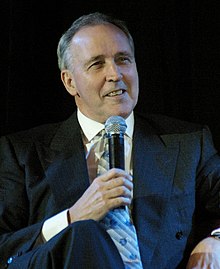Paul Keating
Paul John Keating (born January 18, 1944 in Sydney ) is an Australian politician . He was Chancellor of the Exchequer under Prime Minister Bob Hawke from 1983 to 1991 . In this position he released the exchange rate of the Australian dollar and liberalized the economy. In addition, during his tenure in office there was a high interest rate policy and the notorious "recession we had to have" , the "recession we needed", as he himself put it in a memorable way. From December 20, 1991 to March 11, 1996, he was Hawke's successor himself as Prime Minister.
Life
Keating received his education from College De La Salle in Bankstown . He left school when he was 15 and joined the Australian Labor Party. In 1966 he became president of the NSW Labor Youth Council . In 1969 he joined the House of Representatives and in 1975 he became Australia's youngest Federal Minister. Between 1976 and 1983 he served in the opposition's shadow cabinet and was a spokesman for various resorts, including agriculture, mining and energy. During this time, Keating was also provincial chairman of the Australian Labor Party (ALP) in New South Wales .
When the ALP came back to government in March 1983, Keating became Chancellor of the Exchequer. A position he held until 1991. In this role, Keating was responsible for far-reaching economic reforms, comprehensive tax reforms. During this time he was also responsible for the re-regulation of the state airline and the telecommunications system.
In 1991 he became Prime Minister to succeed Bob Hawke . With his party he continued his progressive reform program, which provided for the introduction of national curricula in schools and a national pension law. Just as important to him were savings in the state budget and solving the problems of the Australian long-term unemployed. As the most important result of his tenure, the regulation of the land rights of the Australian indigenous people, the Aborigines , and the introduction of the corresponding laws can be seen.
Keating turned his attention to Australian foreign policy regarding the Asian territories as its closest neighbors. He took an active role in founding APEC , the Asia Pacific Economic Cooperation . He also promoted other bilateral ties with Australia's neighbors, particularly with Indonesia .
In the parliamentary elections in March 1996, the Labor Party suffered heavy losses. Paul Keating's successor in office was John Howard of the Liberal Party of Australia . Keating also resigned as a MP.
On April 15, 2003, Keating was awarded an honorary doctorate for his economic and legislative reforms and the improvement of relations with Asia.
His book Engagement: Australia Faces the Asia-Pacific , published in March 2000, describes his activities as Prime Minister.
Keating married in 1976, the Dutch Alitalia - stewardess Annita van Iersel (born October 5, 1948) with whom he had four children. In 1998 there was a separation, and Paul Keating got a relationship with actress Julieanne Newbould (* 1957), who had two children from a previous marriage to a general practitioner . Her marriage to Annita, who has been an artist ever since, was formally divorced in 2008. Keating lives in the Sydney neighborhood of Potts Point .
Web links
- Paul Keating's Homepage (Engl.)
| personal data | |
|---|---|
| SURNAME | Keating, Paul |
| ALTERNATIVE NAMES | Keating, Paul John (full name) |
| BRIEF DESCRIPTION | Australian politician, Prime Minister of Australia (1991–1996) |
| DATE OF BIRTH | January 18, 1944 |
| PLACE OF BIRTH | Sydney |


